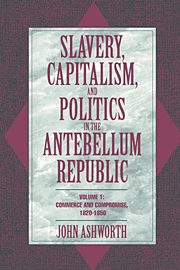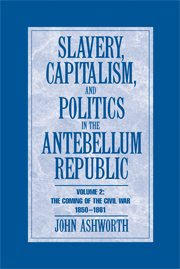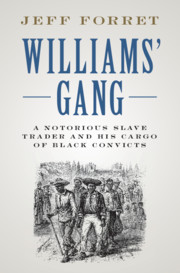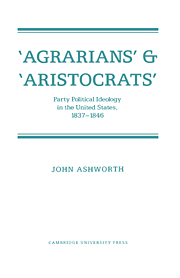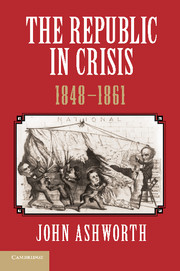Slavery, Capitalism, and Politics in the Antebellum Republic
The Civil War should be seen as America's 'bourgeois revolution'. So argues Dr John Ashworth in this novel reinterpretation, from a Marxist perspective, of American political and economic development in the forty years before the Civil War. This book, the first of a two-volume treatment of slavery, capitalism and politics, locates the political struggles of the antebellum period in the international context of the dismantling of unfree labor systems. With its sequel, the volume will demonstrate that the conflict resulted from differences between capitalist and slave modes of production. With a careful synthesis of existing scholarship on the economics of slavery, the origins of abolitionism, the proslavery argument and the second party system, Ashworth maintains that the origins of the American Civil War are best understood in terms derived from Marxism.
- Major reinterpretation of a central part of American history: the conflict over slavery that led to the Civil War
- The writing is brisk and clear
Reviews & endorsements
"...a different and exciting insight into the crucial role of enslaved African Americans as active participants in historical change. This study is highly recommended reading for Old South and African American scholars seeking to understand the relationship between American slave resistance, northern wage labor ideology, and the development of nineteenth-century capitalism." The North Carolina Historical Review
"To undertake a new study of the causes of the American Civil War is audacious, but John Ashworth has brought off a truly impressive achievement. Whether discussing the ideology of abolitionism, the impact of capitalism on social life, or the social origins of the slavery controversy, Ashworth offers original insights in a field already plowed by many historians." Eric Foner, Columbia University
"...an ambitious and imaginative model of Civil war causality....make[s] a compelling case for Ashworth's Marxist style of cultural history, as well as for a more complex understanding of why the Union fell apart with Lincoln's election." Seth Rockman, Maryland Historical Magazine
"...historical narratives flow well because of Professor Ashworth's competent writing style." Civil War History
"Ashworth's ^Slavery, Capitalism, and Politics is a major contribution to American antebellum historiography." Robert E. Wright, Southern Historian
"John Ashworth's ^Slavery, Capitalism, and Politics in the Antebellum Republic is an attractive mixture of old-fashioned history with new scholarly trends....In addition to his skillful summaries of a wide range of litertaure, Ashworth has added to his own impressive work on Jacksonian ideology by linking the controversies of earlier decades to the crisis that exploded in civil war. When the second volume of this work is completed Slavery, Capitalism, and Politics will stand as the most comprehensive work to have traced the ideological flowerings of the 1850's to their Jeffersonian roots." Bill Cecil-Fronsman, H-Net Reviews
"...Slavery, Capitalism, and Politics is an engaging work that should force a re-examination of antebellum political history. Even those who disagree with elements of Ashworth's analysis or with his premises will find the volume a useful statement of a contradictory position. It is a major work with which all historians in the field will have to reckon." Bill Cecil-Fronsman, H-Net Reviews
"...the broad outlines of Ashworth's work are consistent with the bulk of modern scholarship and resonate well with the contemporary evidence. His concluding volume will be eagerly awaited." Harry L. Watson, Georgia Historical Quarterly
Product details
January 1996Paperback
9780521479943
536 pages
228 × 151 × 35 mm
0.835kg
4 tables
Available
Table of Contents
- Context
- 1. Slavery, Sectionalism and the Jeffersonian Tradition
- 2. Free Labor, Slave Labor, Wage Labor
- Part I. Slavery Versus Capitalism:
- 3. Abolitionism
- 4. The Proslavery Argument: Dilemmas of the Master Class
- Part II. the Second Party System:
- 5. Whigs and Democrats
- 6. Slavery, Economics and Party Politics, 1836–1850
- Conclusion: Part III. Economic Development, Class Conflict and american Politics, 1820–1850.

